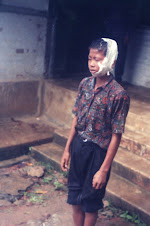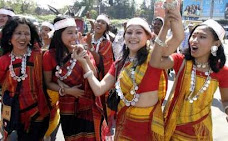Indigenous peoples observe token hunger strike in Sylhet city
On 8 November 2009 indigenous peoples and green activists observed a token hunger strike in the Sylhet city, demanding cancellation of the government decision to cut 4,000 trees at village Nahar Pan Punji in Moulvibazar district.
The Sylhet Paribesh Andolan, an environmental organisation, arranged the token hunger strike programme from 10:00am and 2:00pm on the premises of the Central Shaheed Minar in the city.
More than 500 indigenous people from different areas of the region and activists of 13 environmental organisations and human rights groups participated in the programme. Later, a rally was held with former vice-chancellor of Shahjalal University of Science and Technology, Professor Sadar Uddin Ahmed, in the chair.
The divisional coordinator of the Adivasi Paribesh Raksha Committee, Father Joseph Gomez, delivered inaugural speech at the rally. Representatives from different socio-cultural organisations and political leaders attended the rally. Lawyers EU Shahidul Islam, Bedananda Bhattacharjya, Dr Abdul Awal Bishwas, Sharif Jamil, Abdul Karim Kim, Gouranga Patro, Jubel Lusai, Joseph Haui, Jesmin Lamin and Michel Dandala, among others, spoke at the rally.
The speakers condemned in the government move to cut down 4,000 trees at village Nahar Pan Punji near the Nahar Tea Garden in Shreemangal. They termed the government move a mockery to the indigenous peoples to destroy the trees in the indigenous peoples, while the government is continuing plantation programme across the country.
The indigenous peoples threatened to continue movement pled expressed their pledge to continue their movement against the government order until its cancellation.
It is mentionable that indigenous Khasi people have been cultivating betel leafs in their traditional punjies for generations. However, government recently ordered to cut 400 trees of Nahar Pan Punji destroying cultivation of betel leaf (Pan) which is only source of income of indigenous Khasi people.
25th Death Anniversary of M N Larma observed in Dhaka and CHT
On 10 November 2008 National Committee on Celebration of 25th Death Anniversary of Manabendra Narayan Larma organised half-day programme to mark 25th death anniversary Manabendra Narayan Larma, pioneer of the indigenous Jumma peoples of Chittagong Hill Tracts and former Member of Parliament at National Press Club in Dhaka. The programmes include placing flowers at the portrait of MN Larma, memorial meeting, reciting poetry, lighting and cultural programme.
Presided by eminent academic Prof. Kabir Chowdhury, the memorial meeting was discussed by eminent teacher of Dhaka University Prof Serajul Islam Chowdhury, President of Communist Party of Bangladesh Manjurul Ahsan Khan, presidium member of Gono Forum Pankaj Bhattacharja, politburo member of Workers Party Haider Akbar Khan Rano, teacher of Dhaka University Prof Sadeka Halim, eminent columnist Abul Moksud, general secretary of Bangladesh Adivasi Odhikar Andolon (BAOA) Prof. Mesbah Kamal, executive director of Nijera Kori and human rights activist Ms. Kushi Kabir, information and publicity secretary of PCJSS Mangal Kumar Chakma and secretary general of Bangladesh Indigenpus Peopels Forum Sanjeeb Drong. Member secretary of National Committee Prof. Ajoy Roy delivered welcome speech while Journalist Kamal Lohani delivered the MN Larma memorial lecture at the programme. Discussion was moderated by Associate Professor Robayet Ferdous of Dhaka University and editor of Mqwrum Mr. Dipayan Khisa. Among others, Former adviser to the caretaker government Advocate Sultana Kamal, eminent writer Selina Hossain, Prof Dalem Chandra Barman of Dhaka University, president of BAOA Prof. H K S Arefin, eminent human rights activist Ms. Rosaline Costa, executive director of ALRD Shamsul Huda and attended the programme.
Participants including academics, politicians and rights activists at a commemorative meeting paid rich tributes to M N Larma. Speakers said that M N Larma was not only a leader of the ethnic minority communities but also a leader of all those who were denied their rights as he represented their voice. He had dedicated himself to establishing the rights of deprived people whoever they may be a member of indigenous ethnic community or a mainstream Bengali people.
Prof Kabir Chowdhury said M N Larma was not only the best leader of hills people but also the leader of all deprived people. He was a man whose name still inspired the younger generation years after his death. The killers thought they would wipe out his name from history. But the reality is different. He is remembered by all. But people pronounce the names of his killers with extreme hatred.
Prof Serajul Islam Chowdhury said that we could not yet achieve the freedom we wanted and M N Larma dreamt of, because we could not try the war criminals and recognise the ethnic minority people. The non-recognition of the indigenous peoples in the constitution proves that Bangladesh is yet to become a democratic country. He said the country needed a united struggle to realise the dream of M N Larma, the dream of the people as a whole.
Before the discussion, different organisations namely National Committee on Celebration of 25th Death Anniversary of Manabendra Narayan Larma, PCJSS, BASAD, Bangladesh Indigenous Peoples Forum, Communist Party of Bangladesh, Gono Forum, Workers' Party, BAOA, Hill Students' Council (PCP), BISAF, HWF, Indigenous Students of Dhaka College, BAGACHAS, GIMA, Hill Students' Hostel, Biplobi Workers' Party including academics, media workers and rights activists placed flowers at the portrait of MN Larma. The memorial meeting was followed by lighting at the portrait of MN Larma and cultural programme performed by indigenous artists and Udichi Shilpigosthi. National Committee also published a booklet and a poster.
Demands of National Committee: Earlier on 8 November 2008 National Committee, in a press conference held at Dhaka Reporter's Unity, put forward a charter of demands to the government, which includes renaming of the Chittagong-Rangamati Road after Manabendra Larma, setting up of his statue in either Dhaka or Chittagong and inclusion of his life sketch in national curriculum.
In CHT: PCJSS observed the 25th Death Anniversary of M N Larma in three hill district headquarters in CHT on 10 November. The programmes on this occasion include placing flower-wreaths at the portrait of MN Larma early in the morning, lighting and soaring of paper-balloon at the evening. President of PCJSS Mr. Jyotirindra Bodhipriya Larma paid tribute in Rangamati.
skip to main |
skip to sidebar

Military enforcement

Survive

Torture

Raped & Killed Indigenous Jumma Women

Militarization in CHTs

Religious destruction

Land Grabbing

Indigenous Jumma Villeges burnt down

Atrocities


CHTs is a number one of Millitary Zone in the World.

With Traditional Dress
nandawansa

Military enforcement

Survive

Torture

Raped & Killed Indigenous Jumma Women

Militarization in CHTs

Religious destruction

Land Grabbing

Indigenous Jumma Villeges burnt down

Atrocities
Embassy in Los Angeles
About Bangladesh
Refugee in Homeland

News Papers
Audio & Video
Actrocities & Tortures

CHTs is a number one of Millitary Zone in the World.
Jumma Photo Albums
Jumma Links
Jumma Women

With Traditional Dress
Blog Archive
About Me
- IJPNUSA
- The Indigenous Jumma People Net in North America is for the movement of minority Jumma indigenous people in Chittagong Hill Tracts in Bangladesh. E-mail:jpnus@yahoo.com Webpage:-http://jummapeoplenet.blogspot.com/
